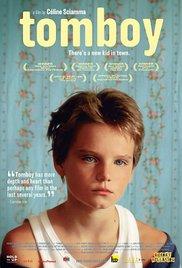
The films of French director Céline Sciamma explore the universality of the human condition. Her diverse characters represent more than just the social groups from which they surface. Their search for meaning is no more or less real than that of the privileged white male who lives across the pond.
_Tomboy_, Sciamma’s first film to earn international attention, follows boyish ten-year-old Laure as she moves into a new apartment with her family. Wearing a white tank top and basketball shorts, she convinces all her neighbors that she is a boy. Laure soon discovers newfound respect, attention and sexual identity.
As her second feature-length movie, _Tomboy_ establishes certain motifs that can be found in all of Sciamma’s work. Most common are her use of reflections and self-given names. Laure oftentimes finds herself looking into a mirror, searching for her true identity, and when she doesn’t find what she wants, Laure renames herself Mickäel.
In Sciamma’s next film, _Girlhood_, Marieme is introduced as yet another protagonist concerned with her role in the world. She is a timid, black adolescent face to face with the reality of growing up as a blue collar worker. When she isn’t accepted into high school, she reinvents herself as “Vic,” a lively young woman determined to live a life worth living.
If color of skin were not so prevalent in contemporary society, _Girlhood_ could easily be a sequel to _Tomboy_. Laure and Mirieme share a lot of common characteristics. They both adopt nicknames, bloom into popularity, express interest in the same sex, and present themselves differently to family and friends.
However, despite the fact that _Girlhood_ is Sciamma’s most recent feature as director, more than just Marieme and Laure embrace these same essential Sciamma characteristics. In the last few years, Sciamma has proved herself as a screenwriting talent, and her authorial idiosyncrasies bleed through her scripts even if they come from another director.
_Being 17_, Sciamma’s first feature-length screenplay, proved that true genius translates from script to screen. Damien and Thomas are two sparring high school students in the Rhône-Alpes region of France. Always fighting at school, they soon discover a deep-set sexual desire that their masculine egos fail to accept.
Although she let André Téchiné realize the potential of the script, the film is undoubtedly indebted to the Sciamma legacy. Much like _Tomboy_ and _Girlhood_, faces tell the story rather than dialogue, and reflections, particularly mirrors, allow the audience entrance into the complicated psyches of her struggling characters.
These same consistencies can be found in her next screenplay, _My Life as a Zucchini_, which recently had a short run at Ragtag Cinema. The film, an animated adaptation of the French novel _Autobiograpie d’une courgette_, was obviously too perfect an opportunity for Sciamma to pass up.
Icare, or Courgette, as he insists on being called, is a nine-year-old whose mother dies in a bout of alcohol-induced rage. When Courgette is shipped to a school for orphaned children, the only remnants of his former identity are a kite decorated with a hand-drawn image of his father and an empty beer can.
Already in good company, _My Life as a Zucchini_ is yet another excellent coming-of-age story. Sciamma and director Claude Barras forge a film that examines the link between parental figures and burgeoning identity. By entering the orphanage, Courgette is offered a chance at self-discovery and an opportunity to find a better life.
With _My Life as a Zucchini_ as a shimmering example, Céline Sciamma continues to approach directing and screenwriting with an admirable objective and a visionary skill. Her work revels in the complexities of childhood, proving that thumb-sucking children can be viciously vile but also fantastic fun.